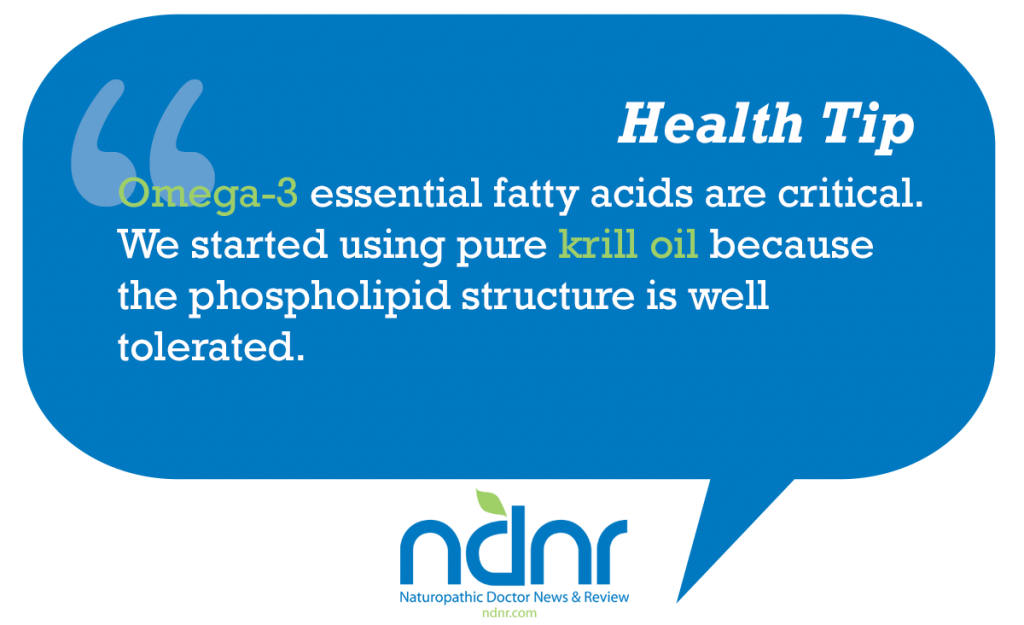Asperger’s Syndrome and High Functioning Autism Treatment of Children and Teens
Diana Joy Ostroff, ND
I had been treating children with autism-like characteristics for years before I had the opportunity of studying it in greater depth. It was always clear to me that although these children received similar diagnoses from their MDs, these children were unique in so many ways.
The diagnostic criteria for Asperger’s syndrome require 2 of the following:
- Marked impairment in the use of multiple, nonverbal behaviors such as eye-to-eye gaze, facial expressions, body postures, and gestures to assist in social interaction.
- Failure to develop peer relationships appropriate to developmental level.
- A lack of spontaneously seeking to share enjoyment, interests, or achievements with other people.
- A lack of social or emotional reciprocity.
1. Restricted repetitive and stereotyped patterns of behavior, interests and activities, as manifested by at least 1 of the following:
- An encompassing preoccupation with one or more stereotyped and restricted patterns of interest that is abnormal either in intensity or focus.
- Apparently inflexible adherence to specific, nonfunctional routines or rituals.
- Stereotyped and repetitive motor mannerisms.
- Persistent preoccupation with parts of objects.
2. The disturbance causes clinically significant impairment in social, occupational, or other important areas of functioning.
3. There is no clinically significant delay in cognitive development or in the development of age-appropriate self-help skills, adaptive behavior (other than in social interaction), and curiosity about the environment.
Though there is no formal diagnosis called “high functioning autism”, there are people who demonstrate autistic behaviors who are high functioning. They are classified under their own separate category. This diagnosis incorporates individuals’ at all functional levels whose symptoms don’t fully correlate with the classic autism symptoms. Many of the differences between Asperger’s patients and high functioning Autistic patients have to do with speech and language development.
The causes of these conditions are still under debate, however there’s a great deal of speculation that mercury-based preservatives, such as those in the MMR vaccination, predisposed many cases. There is also research focusing on the neurotransmitters such as serotonin, dopamine and epinephrine. Postmortem and MRI studies show that many brain structures are involved (ie, cerebellum, cerebral cortex, limbic system, corpus callosum, basal ganglia and brain stem).
Treatment
The treatments these patients often receive from their MDs or psychiatrists include combinations of stimulants, antidepressants, and antipsychotics. A comprehensive list is too long to include in this article.
Despite the challenges with these cases, many of the children I’ve treated naturopathically have experienced excellent results. I’d like to share some clinical pearls and protocols that I have found to be most useful.
Gastrointestinal/Diet
My first priority is managing the gut. A good probiotic is essential in establishing a defense for the gastrointestinal system. A biocompatible antifungal agent is typically necessary, as well as a systemic detoxification protocol designed to eliminate heavy metals, parasites and viruses. I also prescribe essential fatty acids, which I will discuss below.
Typically these children have been medicated and fed a “S.A.D.” (Standard American Diet). Each Individual’s body system must be checked and appropriate herbs or nutrients used to restore balance.
I gradually adjust the patient’s diet to eliminate gluten, casein and refined sugar. I typically put patients on a hygienic diet (compatible with their blood type) of local fresh fruits and vegetables, whole grains, legumes, nuts and seeds, sprouts and fresh homemade juices. These dietary changes are made gradually, in accordance with the parents’ ability to implement the changes in lifestyle for themselves and their family. If they are consuming animal proteins, I recommend organic, free-range exclusively, and deter them from farmed fish and seafood. I have them consume moderate amounts of animal proteins in relation to fresh vegetables.
In Hawaii, almost 7 days a week we are very fortunate to have a variety of local farmers markets. Eating an organic, plant-based diet becomes a delectable option. I provide rules of food combining as well as quick and easy recipes that I have created (and use myself as a busy mother), to make eating at home pleasurable.
Supplements
As far as supplementing these children, I have been using acetyl L-carnitine to buffer oxidative stress, DMAE to promote healthy cognitive function, L-theanine to modulate neurotransmitter activity, and L-carnosine to promote healthy frontal lobe activity.
For whole body detoxification, I use a systemic oral detoxification in spray form because they are easy for any age group to use and have yielded impressive heavy metal and environmental toxin elimination results in independent laboratory tests. I know of a case from an MD colleague who treated a boy, normal at birth who had received vaccinations at age 2. By kindergarten, he was on 3-4 psychiatric medications and required 2 teaching assistants to manage his developmental disability. He was sent home frequently for inability to handle the normal classroom environment. Within 6-8 weeks on this protocol, he was off his psychiatric medications and after 6 months, the teaching assistants could not differentiate this child from others in the classroom, (ie, normal verbal and social skills). Now in first grade, this boy is reading a year ahead of his grade level.
I also use a combination of selenium, alpha-ketoglutaric acid, milk thistle, methionine, taurine, MSM, NAC, and glutathione, as well as a variety of other herbs to open up metabolic pathways in the body.
I always recommend mineral replenishment, but minerals can be bitter and unpleasant. Finding a palatable form that kids will actually consume was a challenge. I really like powder because it has no flavor, odor, or color and dissolves to a clear ionic solution in water. Even the most sensitive child can easily supplement in smoothies, juice, water or other drinks.
For emotional support, I supplement with an inositol-based formula that calms the repetitive, obsessive-compulsive behaviors I see in these children. I have patients mix with unsweetened applesauce at bedtime. It promotes sleep and addresses the repetitive behaviors characteristic of many autistic or Asperger’s patients.
I always support the immune system as I would as part of any naturopathic protocol.
Finally, Omega-3 essential fatty acids are critical. We started using pure krill oil because the phospholipid structure is well tolerated (no reflux) and provides benefits at a low dose. I also like that Antarctic krill are very low on the marine food chain, reducing the risk of bioaccumulation. Krill oil is more sustainable compared to other oils from higher order fish, so it is cleaner. I know of a case in which a 6-year-old autistic child lost his ability to speak and to use the toilet and became lost in his own world for 3 months. After taking pure krill oil for just a few days, his speaking skills and toilet training returned. His mother never believed in dietary supplements, but attributed his recovery to pure krill because there were no other changes in his life.
Case Study Summaries
The children and teens, whom I have treated over the years using varying combinations of the above, have demonstrated marked improvement in their overall responsiveness, focusing abilities, social, emotional, and behavioral maturity and have been able to integrate back into normal school settings gracefully.
One of my patients was a 4-year-old boy. He came in with his mother and completely disturbed the quiet ambience of my clinic. He screamed and made whaling sounds, ran out the front door into the street, and was completely unruly and unsettled. He weighed 110 lbs at four years old. After 3 weeks on my comprehensive protocol, including nutritional recommendations and detoxification, this boy had lost 20 lbs, was able to sit with us quietly in the office, answered questions, and behaved like a sweet child. His mother was elated. She went from being chronically stressed to wearing a smile on her face.
A current patient, a 9-year-old boy, was brought to my office by his mother 3 weeks ago with the diagnosis of Asperger’s syndrome. We began implementing some of the above protocol, always beginning with the diet, the gut, and behavior modification – for both the mother and the son. In 3 weeks, the boy has improved significantly. He used to be up most of the night and is now able to sleep through the night. He is more active at home and has lost 10 lbs of fat. Previously, the child had been taken out of the school system because he wouldn’t pay attention. Now he is more focused on his studies and we are both confident that he will be able to re-enter in the fall.
Assisting the parents in creating these changes in their children has been overwhelmingly rewarding. For more specific information about the enormously successful treatment protocols I have mentioned above, please reach me through my Hawaii Center for Natural Healing.
 Diana Joy Ostroff, ND received her Bachelor of Arts degrees in Psychology and Physical Education from the University of Oregon and the University of Delaware. She completed her premedical sciences and then began to fulfill her interest in naturopathic medicine, Traditional Chinese Medicine and acupuncture from NCNM, the Oriental Medical Institutes of Oregon, Hawaii, and did special in-depth studies of oriental medicine in Japan. Dr. Ostroff has also trained with Hawaiian healers known as Kahunas. She has been practicing in Hawaii since 1989, is a published author, has her own TV show called “Just Ask Dr. Joy,” and conducts regular seminars in her series called “The Wisdom of Well-Being for the Body, Mind and Soul.”
Diana Joy Ostroff, ND received her Bachelor of Arts degrees in Psychology and Physical Education from the University of Oregon and the University of Delaware. She completed her premedical sciences and then began to fulfill her interest in naturopathic medicine, Traditional Chinese Medicine and acupuncture from NCNM, the Oriental Medical Institutes of Oregon, Hawaii, and did special in-depth studies of oriental medicine in Japan. Dr. Ostroff has also trained with Hawaiian healers known as Kahunas. She has been practicing in Hawaii since 1989, is a published author, has her own TV show called “Just Ask Dr. Joy,” and conducts regular seminars in her series called “The Wisdom of Well-Being for the Body, Mind and Soul.”










